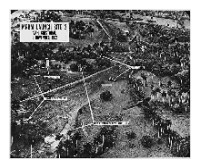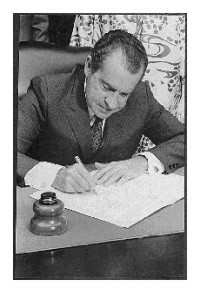Sponsor this page. Your banner or text ad can fill the space above.
Click here to Sponsor the page and how to reserve your ad.
-
Timeline
1961 - Detail
January 3, 1961 - Disputes over the nationalization of United States businesses in Cuba cause the U.S. Government to sever diplomatic and consular relations with the Cuban government.

Article by Jason Donovan
One of the most significant events that helped shape the course of world history during
the Cold War, which continues to the present day, was the Cuban Revolution and its
aftermath. With only 90 miles (145 kilometers) between the United States and Cuba, the
two countries have had a tumultuous history. This history was often one of exploitation.
Up to 70 percent of the farmable land was owned by the wealthy class, or foreign
individuals or corporations. Living under the strong-arm tactics of the dictator
President Fulgencio Batista. Batista and his government were saturated in the slimy
business of corruption. As an ally of the United States, the island nation received
billions in investments.
These investments came with strings attached as the foreign
interests received a free hand to exploit the island’s resources and people. Batista
would attract substantial investment into the island, with $60 million ($689,679,715 as
of 2025) allocated for hotels and casinos alone. By 1957, the investment totaled $350
million ($4.02 billion as of 2025). The criminal underworld in the United States funneled
a large amount of its illicit gains into the island. These arrangements left the vast
underclass to fester in their discontent. Into this discontent steps a charismatic leader,
Fidel Castro.
Castro said, at the beginning of his leadership, he was on the side of the United
States. This changed, partly, due to President Eisenhower deciding to go golfing at a golf course in Gettysburg, where he had his family farm, and
having his vice president, Richard M. Nixon, meet with Castro. Castro was offended by this move. What Eishenhower had not realized, history was about to change its course as a result.

Cuba's Fundamental Law
After his victory in the civil war, he, in 1959, introduced a series of reforms based
on the provisions of Cuba’s Fundamental Law of 1959. This law was based on the
concept of natural law. This concept is, ...
"Natural Law is a philosophical concept that posits the existence of a universal
'higher law' discoverable through reason, which applies to all human beings regardless
of societal norms or religious teachings."
On 17 May 1959, based on Section Two, Article 90 of The Fundamental Law, in
an effort to break up 70% of the land that was owned by foreign interests prior to 1959.
Article 90 sets out the maximum amount of land allowed in each industry. The second
paragraph of this article is the foundation that the future expropriation of foreign
holdings will legally be seized. The paragraph states, ...
"The acquisition and possession of land by foreign persons and companies
shall be restrictedly limited by law, which shall provide measures tending to restore the
land to Cubans."
Combine this with, at the beginning of this document, the language, to paraphrase,
states that the government at the end of the day owns all, even the "subsoil," and that
all lands are for the public good. Resulting from all these legal changes, the
government, on the above date, seized 1,000 acres of land from foreign owners and
forbade foreign interests from buying any further land holdings.
Cuban, United States, and Russian Relations
In 1960, Cuba’s expropriation would speed up. On 8 May of that year, diplomatic
relations between the Soviet Union and Cuba were restored, with trade to follow. The
relationship between the Soviets would, on 28 June, 1960, cause the Cuban government to
seize the United States owned oil refineries without offering the owners any payment in return.
The seizure was due to the fact that the refineries, with a warning from the U.S.
government, refused to refine oil sourced from the Soviet Union. In retaliation, the U.S.
government cut the sugar quota being sold to the United States.
With the presence of communist ideology on the rise, the US imposed the
embargo, which has been in effect to this day, on 19 October 1960. Five days later, the
Cuban government would confiscate the rest of the American-owned property. Less than three months later, this act prompted the United States to sever all diplomatic and consular relations on January 3, 1961.
By the end of that year, Cuba’s course in the Cold War was set on 2 December 1961 when Castro stated he "was a
Marxist-Leninist" and would be till the end of his days.
To think that the history of the Cold War turned on a meeting, or lack thereof.
The seizure of foreign property was a result of decisions made by the United States
government. These decisions pushed the Cuban government into the arms of the
Soviet Union, and to become a Communist state only 90 miles from the U.S. mainland.
Photo above: Montage (left) Fidel Castro arriving in United States, 1959, Warren K. Leffler. (right) Byron Nelson, Dwight D. Eisenhower, Ben Hogan, and Clifford Roberts, 1953, Morgan Fitz. Courtesy Library of Congress. Photo below: Fidel Castro and Nikita Khrushchev, 1960, Herman Hiller. Courtesy Library of Congress. Info source: Florida International University - Digital Communications. "Chronology of U.S.- Cuba Relations." Cuban Research Institute, 21 Apr. 2025; The Editors of Encyclopaedia Britannica. "Fulgencio Batista | Dictatorship, Coup, and Facts." 20 July 1998; Admin. "How Was Pre-Revolutionary Cuba Used for Current Tourism? | SIXTVN Only 99$." SIXTVN Only 99$, 10 May 2025; Roman, Ivan, "A Timeline of US-Cuba Relations-Before Fidel Castro and the Cold War chill, America and Cuba shared close economic and political ties." History.com; British Pathé. "Cubans Celebrates as Government Seizes Us Property (1960)." YouTube, 2014, CrimsonEast. "Fidel Nationalizes American Corporate Property"; YouTube, 2009, Cuban Revolution - New World Encyclopedia; "Natural Law | EBSCO." EBSCO Information Services, Inc. | www.ebsco.com; "Cuba Begins Expropriating Foreign Property | EBSCO." EBSCO Information Services, Inc.; "Fundamental Law Of Cuba 1959", hathitrust.org; Paz, Jaun Valdez, "The Cuban Agrarian Revolution: Achievements and Challenges"; Technical Difficulties. 1997-2001.state.gov/regions/wha/cuba_chronology.html.







